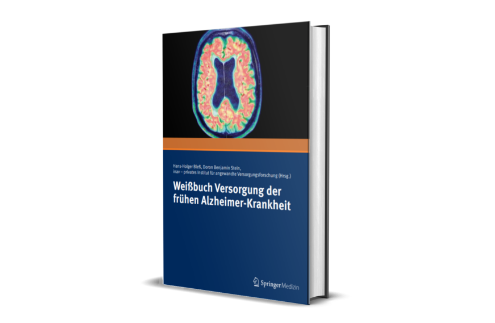White Paper “Care of Early Alzheimer’s Disease”
The white paper ” Care of Early Alzheimer’s Disease” examines the current state of research and highlights the causes, diagnosis, and treatment approaches of early Alzheimer’s disease.
The number of people affected by dementia in Germany is steadily increasing, with Alzheimer’s disease being the main cause in two-thirds of cases. Nevertheless, early Alzheimer’s disease is being diagnosed too rarely. Thus, the stigma associated with the disease keeps many people from seeing a doctor. The white paper “Care of Early Alzheimer’s Disease” deals with the current state of research and sheds light on causes, diagnostics and therapeutic approaches of early Alzheimer’s disease. In addition, the white paper provides proposed solutions to address existing and future care challenges. Experts consider prevention and early diagnosis to be crucial in this context.
At the beginning of the 2000s, Alzheimer’s disease could only be reliably diagnosed post-mortem by performing a brain autopsy. Today, the disease can be diagnosed prior to the onset of dementia. This became possible by detecting Alzheimer’s biomarkers, such as beta-amyloid or tau, in the cerebrospinal fluid or in positron emission tomography (PET), and likely in the near future also in the blood. These advances in Alzheimer’s research have far-reaching implications for the care of those affected and the reorganization of health care structures.
Among the most important learnings: Alzheimer’s care must start at an early stage. “We need interventions as early as possible to halt or slow the course of this progressive disease,” said Dr. Uwe Meier, chairman of the board of the Professional Association of German Neurologists (BDN) and a patron of the project. “In the case of advanced neurodegenerative degeneration, we can only accompany the course of the disease.”
In addition to the hope for pharmacological therapies, lifestyle aspects will also become more relevant in the future. “Whereas a decade ago dementia in Alzheimer’s disease was seen as a fateful event, today we assume that up to 40 percent of the risk of developing dementia depends on modifiable factors. It therefore seems possible to influence one’s own dementia risk by adopting an active and healthy lifestyle,” explains Prof. Dr. Frank Jessen, Director of the Department of Psychiatry and Psychotherapy at the University Hospital Cologne, who is a co-author and also a patron of the publication.
The National Dementia Strategy (NDS) signed by the German government in 2020 was an essential step. The task now is to set a new course in Germany to identify and treat early cognitive impairment and Alzheimer’s disease in a timely manner. The care of patients in the early stages of Alzheimer’s disease also requires significant effort. In the future, the care provision will also be concerned with ensuring that the expense of (differential) diagnostic procedures is appropriately remunerated and that appropriate structures are created. In addition, due to the expected growing needs, Alzheimer’s care will require a higher degree of networking between the treatment providers involved. In the view of the experts involved, pilot models, digital solutions and the expansion of outpatient memory clinics will therefore be key components of future care.
Publication
Free download of the white paper “Care of Early Alzheimer’s Disease” is available under: https://alzheimer-dialog.de/ (German language version only)
Transparency Note
The White Paper was prepared with the financial support of Biogen GmbH.


